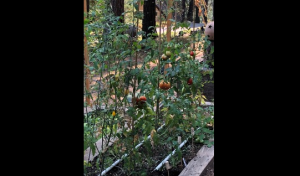I planted my first garden at 4000 feet this year. I experimented, and documented the successes, and misses in my garden journal to remember what changes to make next year. I started all plants from seed and hardened them off (transitioned from indoor to outdoor over 2 weeks in shade, and gradually moved to full sun) prior to transplanting.
Part of my experiment was to duplicate planting the same tomato plants in raised beds and in pots. My rationale was that the raised beds were somewhat shaded during a prime time of the day from the towering cedars and pines, and I bet they would thrive and be more prolific with their need for more sunlight (6-8 hours).
The pots were protected in a fenced-in dog pen (we are dog-less at this juncture), which was ideal as it was protected from deer, and it is an eastern-facing location. Of course, our house bakes in the sun, and gets very hot in the summer months as opposed to the garden beds installed by the previous owners.
I planted 5 types of tomatoes: Heirloom Black Krim, Heirloom cherry, Roma, Ace 55, and yellow pear. I picked up all of my seeds at the, not to be missed, Annual Seed Share event in Sonora. It is a collaboration between the Master Gardeners of Tuolumne County and the Foothill Collaborative for Sustainability (“FoCuS’). If you are interested in planting a garden for your first time, this is the place to start! You can ask questions of Master Gardener’s while you select your seeds.
I used tomato cages for the indeterminate tomato varieties for both the beds and the pots. For the pots, I used a mixture of plastic 15-20-gallon remnants that I had which I sterilized with a 10% bleach solution, followed by mild soap and water. I also purchased some 10-gallon grow bags and incorporated those as well.
My results:
Pots:
- All of the varieties in the pots, with the increased daily sun exposure were more prolific.
- Harvesting was very easy, as it was a single row of plants.
- The tomato cages worked well between the metal fencing and the cages and plants supporting each other.
- Not many issues with squirrels or critters.
- Watering was manual but gave me an opportunity to assess the garden regularly.
Beds:
- The flimsy deer netting I used to encircle the beds actually worked, a buck came up and stared at it and walked away. However, we have had fewer deer lately, due to some new construction nearby.
- Harvesting and weeding in the beds was more work, as 2/3 of the beds are not raised, so I did have some weed issues.
- There were a few squirrels, and chickarees that got into the beds, but overall, it wasn’t a big issue.
- As suspected, the harvest wasn’t as prolific as the increased daily shade impacted the plant’s production.
- Watering was utilizing irrigation pipe with drill holes dispersed, on a timer.
A few things I will do differently next year are:
- Add to my calendar the fertilization dates, to supply and even amount over the course of the season.
- Be particular about what types of tomatoes I choose to plant, based on my journal notes.
- Plant more seedlings in additional grow bags and try the larger-sized planter type and grow 2-3 plants in each.
- Try using the local winery’s turkey manure, it has a high rating from other local gardeners, and the cost compared to bagged soil amendments is favorable. Buying a yard seems like a lot, but I made multiple trips for bags, which in the end was more expensive.
In summary, planting in pots is a very nice option. Especially if space is limited, and constructing beds is not a long-term option. The reward of gardening with a little effort and harvesting on a daily basis is unparalleled. It’s like getting little presents every day!
Ann Arshakuni is a University of California Cooperative Extension Master Gardener of Calaveras County.
UCCE Master Gardeners of Tuolumne and Calaveras Counties can answer home gardening questions. Call 209-533-5912 or fill out our easy-to-use problem questionnaire here. Check out our website here. You can also find us on Facebook.


